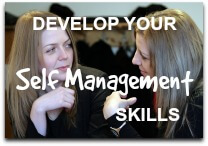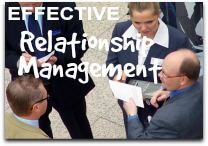- Home
- Emotional Intelligence
- Self Awareness
Self Awareness |
By Mark Connelly |
Self awareness is the foundation of personal growth and success. Daniel Goleman calls it the 'keystone' of emotional intelligence. Find out how this powerful tool recognized by leading psychologists and change agents can revolutionize your life starting today.
Recognize and understand your emotions and you have the power to control them.
This kind of attention to your thoughts and feelings makes it impossible for your emotions to rule you. Unless you choose to give them the upper hand.
In his address to the Governing Board of the Pan American Union in April 1939 US President Roosevelt said that "Men are not prisoners of fate, but only prisoners of their own minds. They have within themselves the power to become free at any moment."
Roosevelt's insight, shared by thought leaders around the world, points to an opportunity to achieve the ultimate freedom.
You can stop reacting to events and emotions and learn to choose your response to any situation.
This is the key to greater confidence and assertiveness in your life.
Don't be a prisoner of your own mind. Achieve the freedom you deserve.
Start by learning more about yourself.
Self Awareness meets Emotional Intelligence
Emotional intelligence consists of four basic capabilities, or domains. These are:
- Self Awareness (this page)
- Self Regulation
- Social Awareness
- Relationship Management
Use the links above to find out about the other domains or get an overview of emotional intelligence here.
Know Yourself
Before you can make changes in yourself you have to know what there is to work with. Becoming self-aware is about the process of understanding yourself.
Emotional awareness means being able to recognize emotions that you experience, understand the feelings associated with the emotion, and understand what you think and do as a result.
Professional sportsmen and women get intensive training to help them recognize and overcome emotions.
It's essential they don't allow their performance to be affected by frustration or anger.
 Photo by Markus Spiske
Photo by Markus SpiskeTo increase your emotional awareness download this audio session to discover your identity and develop a strong sense of who you are using the gentle persuasion of hypnosis.
When you're aware of your strengths and limits you'll be more confident about what you can and cannot do. Self-confident people are more assertive about what they believe to be right.
Being assertive doesn't mean you always get your way but rather that you convey your thoughts and ideas confidently and justify why you believe a particular decision or idea is the right one.
According to Daniel Goleman the competencies associated with self-awareness are:
- Emotional self awareness: recognizing your emotions and the impact they have on your life.
- Accurate self-assessment: identifying your strengths and limitations.
- Self-confidence: knowing your self worth and capabilities.
Developing Self-Awareness
Awareness of self and emotions can be developed. Spend some time recognising areas you need to develop and intentionally making an effort to develop or strengthen that aspect of yourself.
So, how can you become more aware of your strengths and areas for development?
You could:
- Rate Yourself: What do you think your strengths are?
- Ask others for feedback: Be open to hearing what others think of you.
- Complete a formal assessment test. These could include a personality test, discovering your values, your skills, your abilities.
In reality a combination of all three of these is best.
Try This
Keep a journal of your feelings: Write down what was happening, what you're feeling, and how you reacted. Was there a physical reaction, such as racing heart, sore neck and shoulders?
Make a list of your roles: and write down the feeling connected to each role. You might be a brother, sister, employee, husband, wife, mother, father, sportsman or woman - think of as many as you can. Your feelings for each role might be happy, frustrated, anxious...again, think of as many as you can.
Predict how you will feel: think about a situation you're going into and predict how you will feel. Practice naming and accepting the feelings. You might say "I may feel angry", or "I may feel frustrated". Naming the feeling puts you in control. Try to choose an appropriate reaction to the feeling rather than just reacting to it.
Emotionally intelligent people plan to put time aside to build awareness. One way to do this is to meditate or reflect daily.
This means that you plan to create a quiet space for yourself in the day, away from work or other activities, and spend time focusing on doing something that opens your mind to deeper thoughts.
Values, beliefs and assumptions
Values are the principles, standards, morals, ethics and ideals that guide our lives. Knowing your values is an essential part of building awareness of yourself.
Knowing your values is like following a well sign-posted road. You're comfortable and secure because you know where you are, you know where you're heading, and you're confident, relaxed and happy knowing you're on the right road.
Here's a great personal assessment I created to help you discover your values. Complete the other three parts of this assessment for a complete awareness building exercise.
Assumptions
Developing awareness of the assumptions we hold about others is an important aspect of emotional intelligence. Self awareness also means that we shouldn't ignore the assumptions we hold about ourselves.
Assumptions about ourselves can be positive or negative. Negative assumptions include thoughts such as ‘Bad things always happen to me’ or ‘I don’t know enough to start my own business’. Positive assumptions might include thoughts such as ‘If I keep trying I will be successful’ or ‘People are inherently good’.
Try This
Spend some time thinking about a challenging task you performed recently. Can you think of one? It could be work related, or something you did at home.
- What were the first thoughts you had about your ability to complete the task?
- If your immediate thoughts were positive how do you think this influenced your ability to complete the task?
- If your first thoughts about yourself were negative - that's ok! But spend a little time thinking about how these thoughts made you feel about completing the task. How could you turn this thought around next time? Take a moment to write down a more preferred positive thought you could try next time.
The beliefs that we have about ourselves are important as they determine our behaviour.
To have greater self awareness or understanding means to have a better grasp of reality. Dalai Lama
Self awareness is the essential building block for emotional intelligence. Becoming self aware is a journey and we'll probably spend a life time learning about ourselves. But as we improve self awareness we also improve our experience of life, create opportunities for better work life balance , become aware of our emotions, and improve our ability to respond to change.
Leave your thoughts below and keep in touch by visiting our Facebook Page and clicking 'Like' to join the community.
Take the next step to emotional intelligence - Self Regulation
Get Professional Help Now.
Unsure what to do or where to start?
It’s quick and easy to make contact with a friendly counselor, and a program that really helps.
Connect with a professional and efficient therapist, and use online therapy, in your own time, to get help with your challenges.
2 Simple Steps:
- Click on the link below. It only takes a minute to get started.
- Select a plan that suits you - and access your complete online therapy toolbox.
There are so many different parts to your therapy toolbox: there's yoga, a journal, worksheets, as well as therapist chats.
Then schedule a time to talk to a therapist of your choice by phone, video, or online messaging.
Get help now. Click here...or the image below.
- Home
- Emotional Intelligence
- Self Awareness
- Home
- Self Regulation
- Self Awareness
- Home
- Social Awareness
- Self Awareness
- Home
- Relationship Management
- Self Awareness







